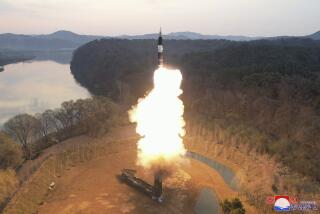N. Korea Nuclear Arms Potential Cited by CIA : Weapons: Pyongyang may already be able to make at least one device, Woolsey tells Senate panel.
- Share via
WASHINGTON — The United States intelligence community believes that North Korea already may have manufactured enough material to make at least one nuclear weapon and that it has become the greatest single problem for nations trying to curb the spread of dangerous weapons, CIA Director R. James Woolsey said Wednesday.
Testifying before Congress on worldwide arms proliferation problems, the CIA director said North Korea ranks “almost in a class by itself.”
It is worse than other nations, he explained, not only because of its nuclear weapons program but also because of its efforts to produce longer-range missiles and its willingness to export missiles to “any nation that is willing to pay.”
It was the first time that any senior American official has testified publicly that North Korea may already have enough material to make a nuclear weapon.
His suggestion that North Korea may have secretly produced enough fissionable material for a bomb would help explain the current standoff over the International Atomic Energy Agency’s efforts to inspect its nuclear facilities. “An obvious reason for the standoff is that North Korea has something significant to hide,” he said.
A year ago, then-CIA Director Robert M. Gates said North Korea was “a few months to a couple of years” away from having a nuclear weapon. But in subsequent months, other American officials scaled back that forecast.
Some nuclear weapons specialists outside the American government have given even greater estimates of North Korea’s capability than the CIA gave on Wednesday. Gary Milhollin, director of the Wisconsin Project on Nuclear Arms Control, a private group, said last summer that North Korea had enough material for six to eight nuclear weapons.
Woolsey, in his first appearance before Congress since he was confirmed earlier this month as director of central intelligence, also disclosed Wednesday that cooperation between the CIA and Russian intelligence officials has broadened considerably.
The CIA director was asked by Sen. John Glenn (D-Ohio) whether American and Russian intelligence officials have a “liaison” relationship, the usual term for friendly and cooperative ties between two nations’ intelligence services.
“We do now, from time to time, have some discussions with the Russian intelligence service,” Woolsey told members of the Senate Governmental Affairs Committee.
He said these talks, involving weapons proliferation and other issues, are “a new departure for the (CIA). . . . It’s a new world out there.” Woolsey said that Yevgeny M. Primakov, chief of the Russian intelligence service, may visit him in Washington.
The timing of the CIA director’s remarks may add pressure on the IAEA and the U.N. Security Council to insist on full international inspections in North Korea. Pyongyang recently refused to grant IAEA inspectors access to its nuclear facilities. This week, officials of the IAEA have been meeting in Geneva to decide what to do about North Korea’s intransigence.
The meetings are expected to conclude today with some decision by the IAEA about what action, if any, should be taken against North Korea. Any action to enforce an inspection regime would have to be approved by the Security Council.
“A North Korean nuclear weapon would threaten both our allies in all of Asia and U.S. forces as well,” Woolsey said.
He said North Korea has emerged as a key supplier of Scud missiles and other dangerous weapons to Middle Eastern countries such as Iran and Syria, which are finding it tougher to obtain arms and technology from the West. Further, he noted, the North Koreans have developed and are marketing a new missile with a range of more than 600 miles.
CIA officials testified Wednesday that North Korea has stockpiles of chemical weapons and is doing research on biological warfare.
More to Read
Sign up for Essential California
The most important California stories and recommendations in your inbox every morning.
You may occasionally receive promotional content from the Los Angeles Times.













